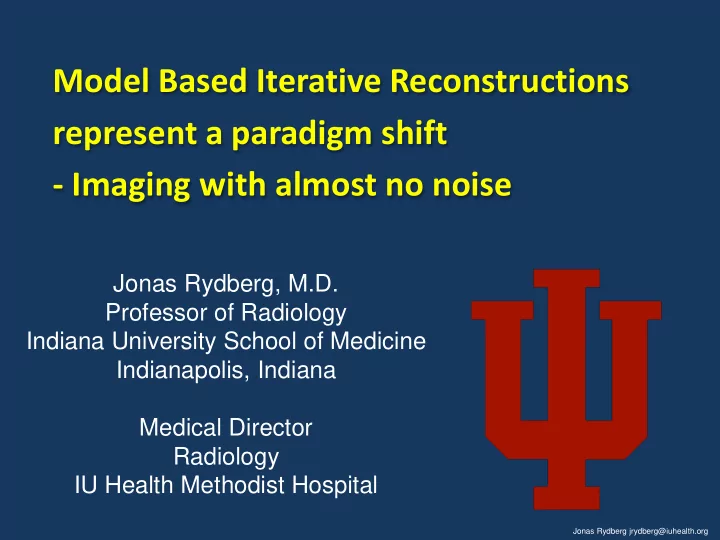

Model Based Iterative Reconstructions represent a paradigm shift - Imaging with almost no noise Jonas Rydberg, M.D. Professor of Radiology Indiana University School of Medicine Indianapolis, Indiana Medical Director Radiology IU Health Methodist Hospital Jonas Rydberg jrydberg@iuhealth.org
Disclaimer: IU Health Methodist Hospital collaborates with Philips Healthcare on CT imaging. iDose Iterative Reconstructions (IR) IMR Model Based Iterative Reconstructions (MBIR) The experience shared in this presentation is based on work with iDose (IR) and IMR (MBIR) both Philips Healthcare. But, only the terms “IR” and “MBIR” will be used to name the two techniques. Jonas Rydberg jrydberg@iuhealth.org
Conclusions from body imaging and CTA: Iterative reconstructions (IR) - Radiation dose reduction 50% or more Model Based Iterative Reconstructions (MBIR) - More radiation dose reduction - Improve the diagnostic image quality Jonas Rydberg jrydberg@iuhealth.org
Iterative reconstructions (IR): Same patient scanned using IR on different occasions with different reference mAs. Significant dose reductions possible. 300 mAs 98 mAs 71 mAs CTDIvol (mGy) CTDIvol (mGy) CTDIvol (mGy) 17.5 5.74 4.81 Jonas Rydberg jrydberg@iuhealth.org
Radiation dose reduction Abdomen-Pelvis with IR FBP: 120 kVp Ref mAs 300 Radiation dose 19.6 mGy reduction IR: = 40 % 120 kVp Ref mAs 173 11.8 mGy (More recently we have moved the Reference mAs to 154 = 50% radiation dose reduction.) Jonas Rydberg jrydberg@iuhealth.org
Radiation dose reduction Abd/Pel with MBIR FBP: 120 kVp Ref mAs 300 19.6 mGy IR: 120 kVp Ref mAs 173 11.8 mGy Radiation dose reduction MBIR: = 66 % 100 kVp Ref mAs 154 6.7 mGy Jonas Rydberg jrydberg@iuhealth.org
There are no extreme cases of radiation dose reduction presented here. All cases in this presentation were scanned with our standard IR (iDose level 4) kVp = 120 kVp Reference mAs = 173 or higher The purpose was to explore if MBIR could add diagnostic quality instead of just reducing the radiation dose. Jonas Rydberg jrydberg@iuhealth.org
MBIR – A challenge for radiologists FBP / IR MBIR Hard to accept this look Jonas Rydberg jrydberg@iuhealth.org
Even tougher challenge with non-enhanced scans FBP / IR MBIR Radiologist reactions: Bland Not right Water colors Waxy “Monet effect” Texture missing Jonas Rydberg jrydberg@iuhealth.org
Can you handle the truth? FBP / IR MBIR The difference is reduced noise! Jonas Rydberg jrydberg@iuhealth.org
Texture?! Is there such a thing as “texture” in CT images? Jonas Rydberg jrydberg@iuhealth.org
“ Texture ” Random page from Radiographics 2013 Please, take a few seconds to review the “texture” of mets and liver parenchyma. Jonas Rydberg jrydberg@iuhealth.org
“ Texture ” Random page from Radiographics 2013 For the past 30 years I have been convinced that I have viewed the texture in both liver parenchyma and metastasis. “Am I wrong?” Jonas Rydberg jrydberg@iuhealth.org
”Texture” of liver metastasis Model Based Iterative Filtered back projection Iterative reconstructions reconstructions FBP IR MBIR Somewhat strangely the ”texture” decreases with MBIR. Likewise strangely the texture of the metastasis and the liver parenchyma seems to be the same on both FBP and IR.
D oes fluid in urinary bladder have “texture”? Which image is closest to the truth? IR MBIR 130167039
What shall fluid in the stomach look like? Like IR or MBIR? The same question then regarding liver! IR MBIR 130167039
What shall kidneys look like? IR MBIR Maybe MBIR depiction is closest to truth? 130167039
How about the air around the patient? FBP IR MBIR Jonas Rydberg jrydberg@iuhealth.org
How about the air around the patient? FBP IR MBIR Jonas Rydberg jrydberg@iuhealth.org
Texture? There is no such thing as “texture” as we have always believed. - It is just noise to varying degrees! Jonas Rydberg jrydberg@iuhealth.org
Texture of a renal cancer MBIR IR Cancer Cancer + noise There are multiple black and white noise pixels projecting over the tumor that we take for texture of the mass. CT140015501 Jonas Rydberg jrydberg@iuhealth.org
“Black noise” and “White noise” Reducing image noise has been one of the major goals for the CT development during the past 35 years. We are so used of seeing noise that we barely are aware of it. It has gone so far that the noise reduction with MBIR can creates confusion radiologists. Noise destroys the diagnostic quality of the images. To better understand the negative effect of noise in FBP and IR I think in terms of “Black noise” and “White noise”. That will be discussed in the following cases. Please, note that the black and white noise is an expression that I have adopted based on my own observations. You may see it expressed in other terms in the literature. The “noise” is typically quantified and expressed in standard deviations (SD).
MBIR improves diagnostic quality. The following examples intend to show how MBIR improves the diagnostic quality over FBP and IR. Jonas Rydberg jrydberg@iuhealth.org
8 mm cyst in liver Depiction superior with MBIR IR MBIR 8 mm Unenhanced scan with slice thickness = 4 mm Jonas Rydberg jrydberg@iuhealth.org
IR - “White noise” degrades depiction of both the center and the border of the cyst MBIR IR Compare “ Avg HU” and “SD” Jonas Rydberg jrydberg@iuhealth.org
If slice thickness is decreased to 1 mm noise hurts the IR technique IR MBIR MBIR is noise resilient even at 1 mm slice thickness Jonas Rydberg jrydberg@iuhealth.org
4 mm slice thickness depicts cyst better than 1 mm but there is a price to pay with increased partial volume averaging. IR MBIR Jonas Rydberg jrydberg@iuhealth.org
FBP MBIR IR Jonas Rydberg jrydberg@iuhealth.org
Which technique depicts cysts the truest? FBP IR MBIR Jonas Rydberg jrydberg@iuhealth.org
FBP IR MBIR Jonas Rydberg jrydberg@iuhealth.org
FBP IR MBIR Jonas Rydberg jrydberg@iuhealth.org
FBP IR MBIR Jonas Rydberg jrydberg@iuhealth.org
FBP IR MBIR Jonas Rydberg jrydberg@iuhealth.org
IR MBIR Jonas Rydberg jrydberg@iuhealth.org
IR MBIR Jonas Rydberg jrydberg@iuhealth.org
IR MBIR 4 mm 1 mm 4 mm 1 mm Jonas Rydberg jrydberg@iuhealth.org
Between yellow arrows clear border delineating higher and lower density tissues. Jonas Rydberg jrydberg@iuhealth.org
Jonas Rydberg jrydberg@iuhealth.org
Jonas Rydberg jrydberg@iuhealth.org
Jonas Rydberg jrydberg@iuhealth.org
Recommend
More recommend